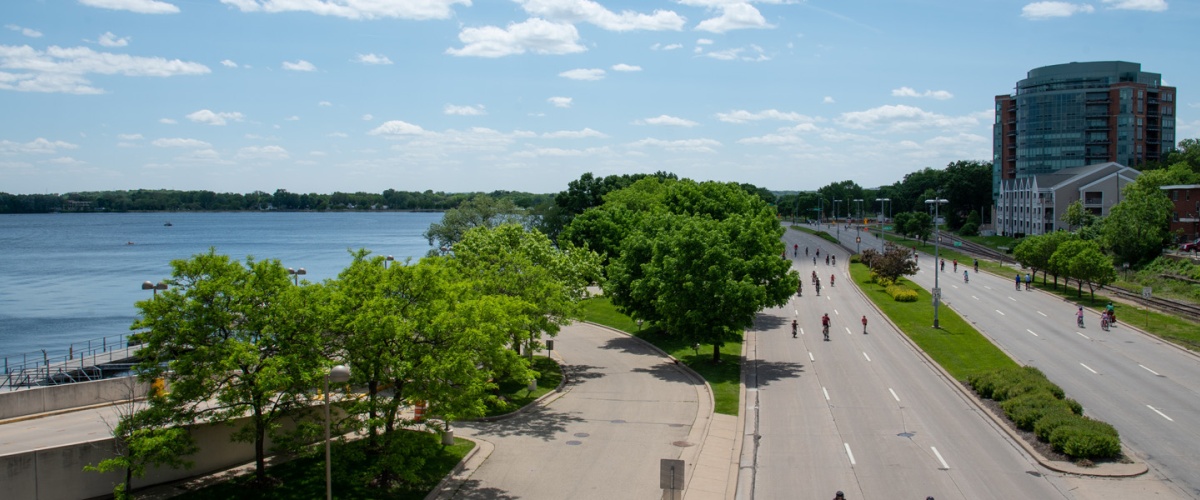
Mayor Announces Climate Forward: Investing in a Clean, Healthy, and More Resilient Future
Today during Earth Week, the Mayor unveiled her Climate Forward agenda (attached), which outlines the actions the City will take to advance its work to combat climate change over the next two years. Climate Forward highlights efforts that will reduce emissions, improve our resilience, and support green job creation in Madison.
“We have a scientific imperative to nearly halve our emissions by 2030, and we must ramp up our work to meet that goal,” said Mayor Rhodes-Conway. “Climate action about improving air quality and public health, lowering utility bills for residents and businesses, and creating more opportunities for good paying, high quality jobs. I believe Madison is ready to accelerate climate action for the benefit of our community and our world.”
Highlights of Climate Forward:
- Meet 100% of our municipal operations electricity needs with renewable energy (the City has currently reached 74% renewable electricity)
- Accelerate the replacement of thousands of streetlights with LED bulbs
- Upgrade the energy performance of affordable housing and commercial buildings through programs and policy initiatives
- Charge forward on a bus rapid transit system with electric buses
- Launch a community climate grant program to help community organizations reduce emissions and increase their resilience
- Expand City green job training programs that help train people from underrepresented communities to install solar panels, install LED lighting, plant trees, work on electric vehicles, and more, and build the career ladders they need for a career in the trades.
- Continue investing in stormwater infrastructure and green infrastructure to improve our water quality, reduce urban heat island effects, and manage flooding.
Energy Efficiency in Rental Housing
With a new $250,000 grant from the Wisconsin Public Service Commission’s Office of Energy Innovation, the City is partnering with Sustain Dane, Elevate, and the Northside Planning Council to make energy efficiency improvements to “naturally-occurring affordable housing” or NOAH. NOAH refers to rental housing that is not subsidized, but is considered affordable based on rents charged, and is in areas where half the population earns at or below 80% of area median income. The grant will allow Sustain Dane and Elevate to complete energy upgrades to small- and medium-sized apartment buildings in Southwest Madison, and seek new projects for energy audits and upgrades on Madison’s Northside with support from the Northside Planning Council. In total, we hope to upgrade over 100 units of rental housing with this grant, and reduce energy use by an anticipated 20%.
“Existing affordable housing uses on average 33% more energy than market rate housing because it is generally older,” said Sustain Dane Executive Director Claire Oleksiak. “We also have an affordable housing shortage. Reducing operating expenses can keep units affordable and improve resident comfort in their homes.”
Energy Efficiency in Commercial Buildings
Commercial buildings make up nearly one-third of emissions in Madison. We cannot achieve our climate goals in Madison without improving the efficiency of this sector. In partnership with Alders Evers and Abbas, Mayor Rhodes-Conway is launching an effort to engage with building owners, operators, energy service experts, and more to identify programs or policies that will significantly increase the efficiency of and reduce emissions from large commercial buildings in Madison.
“There are dozens of cities across the nation that have put policy measures in place to reduce emissions from the building sector,” said District 13 Alder Tag Evers. “Madison has the ability to learn from those examples and find a solution that works locally.”
“This effort is in large part motivated by our climate goals, but we see multiple benefits of this work for building managers and tenants too,” said District 12 Alder Syed Abbas. “Energy efficiency can pay back quickly, ultimately saving money and increasing comfort too.”
